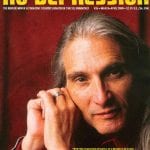Jim Roll – Bash over Beethoven
Like the man himself, Jim Roll’s albums — 1998’s Ready To Hang and the new Lunette — are plain-spoken, sincere, thoughtful and intelligent, with a gentle, self-effacing wit that helps Roll clear the sand trap of singer-songwriter sap.
“He seems like he’s been doing it since he was born,” says Walter Salas-Humara, the longtime leader of the Silos who produced Lunette, released in January on New West Records. “He’s very natural and open, not forced. He has a natural facility with language, and a sort of intellectual edge, and a homey familiarity.”
A native of the northwest Chicago suburb of Itasca, Roll has lived for most of the last decade in Ann Arbor, where he received a master’s degree in social work from the University of Michigan. He honed the songs that became his debut album at local venues such as the Gypsy Cafe and the Cava Java, as well as the open-mike night at the Tap Room in neighboring Ypsilanti.
As an undergraduate at Northern Illinois University in De Kalb, Illinois, Roll fronted a cover band called the Bald Willies. In 1993, he moved to Frankfurt, Germany, for love and busked on the streets for money, but neither the relationship nor the gig would last: “The frustration mounted,” Roll says, “until finally I smashed that guitar over a bust of Beethoven’s head.”
Returning to Ann Arbor, Roll got serious about his songs and hit the coffee shop circuit. Ready To Hang was modest in its aims but beguiling for its simplicity. The songs broke into two camps: Telecaster-driven roots-rockers such as “Another Lover” and unplugged country-folk ballads such as the title track. Myriad instrumental details — fiddle, mandolin, accordion, organ, and penny whistle among them — were unexpected nuggets of surprise.
But the focus was always on Roll’s voice — at its best when leaning deliciously into the elongated syllables of the aching chorus of “Train” — and his careful imagery in songs such as “The Fall”: “They made love two weeks later to the humming of her bedroom fan/And the candlelight jumped and he traced the palm of her hand.”
Roll was happy with his self-produced debut, but wasn’t content to sit still. “The charm and rawness of the first one were really enviable to me,” Roll says. “I wanted [the next one] to be charming and simple too…country-influenced songs that express emotion. But I also didn’t want to limit it.”
So Roll decided to hire an outside producer, someone who would push him to grow and build on his songs. A Silos fan since that band’s 1985 debut About Her Steps, Roll decided to approach Salas-Humara. “I heard Heater [the Silos’ 1998 album], and it sounded like About Her Steps, and yet it sounded like the future,” Roll says. “Walter had his feet in both places.”
“Left up to his own devices, Jim seems more into traditional folk and bluegrass,” Salas-Humara says. “But he’s also totally willing to experiment, so we did a lot of interesting things. Lately, I’ve been interested in ‘found sound’ and distortion and weird effects, so we were able to meet in the middle somewhere.”
In addition to his adventurous aesthetic, Salas-Humara brought several musician friends to the sessions for Lunette. The Silos’ latest rhythm section, drummer Konrad Meissner and bassist Drew Glackin, backed Roll for several album tracks. A pair of roots-rock heavyweights — former True Believer Jon Dee Graham (a New West labelmate) and longtime Lucinda Williams sideman Gurf Morlix — sat in on guitar.
Salas-Humara’s fingerprints are all over Lunette, from the atmospheric, sample-heavy “Everything” to the garbage-pail percussion of “Dear”. But Roll’s personality never gets buried; fans of his first album will feel at home from the first chords of the upbeat opener “1955”.
The album’s centerpiece, “These Winds”, finds the blend of Roll and Salas-Humara at its most intriguing. Roll’s vocal is backed only by a violin and cello; multi-tracked strings jabber distractedly against the voice, then float it along.
But even given the new record’s expanded sonic palette, Roll’s stories still supply the songs’ heart. And that may account for the biggest difference between the albums: Where Ready To Hang was a catalog of restlessness and regret, Lunette is hopeful.
“At the risk of sounding pretentious, I’ve gone through some spiritual development between the two records,” Roll says. “Since Ready To Hang, I ended up getting married and settling in a little bit.
“So where the first was about longing and disappointment, about that hole in yourself that you want fulfill, this one is about finding some answers. Of course, I had to let go of almost every expectation I had. It’s wonderful, but it’s nothing like I thought it would be.”




